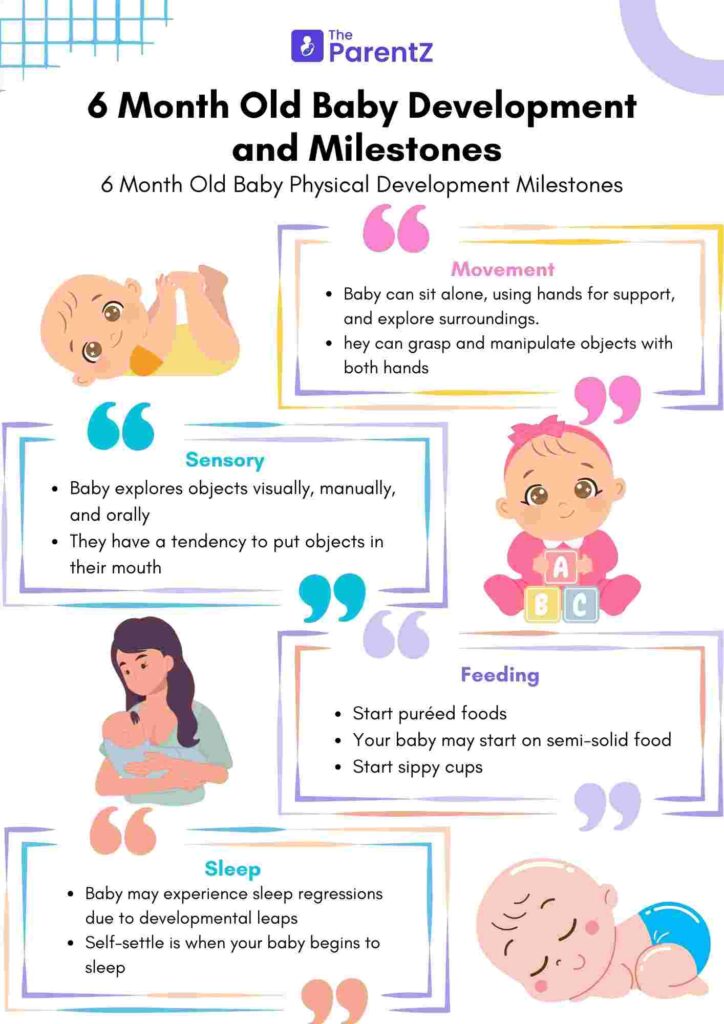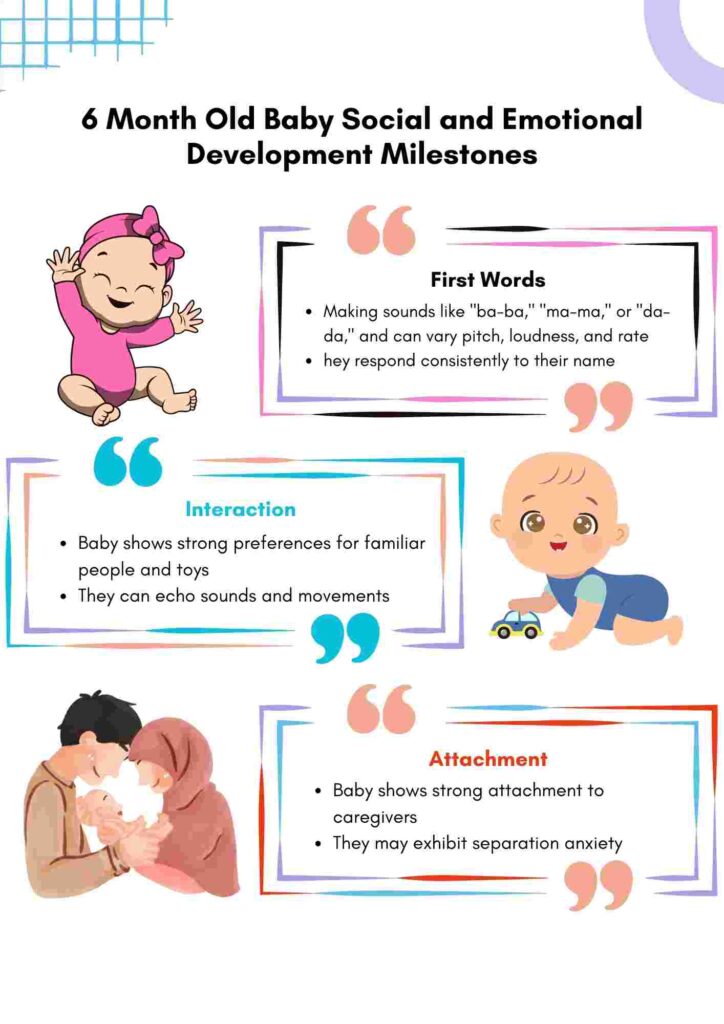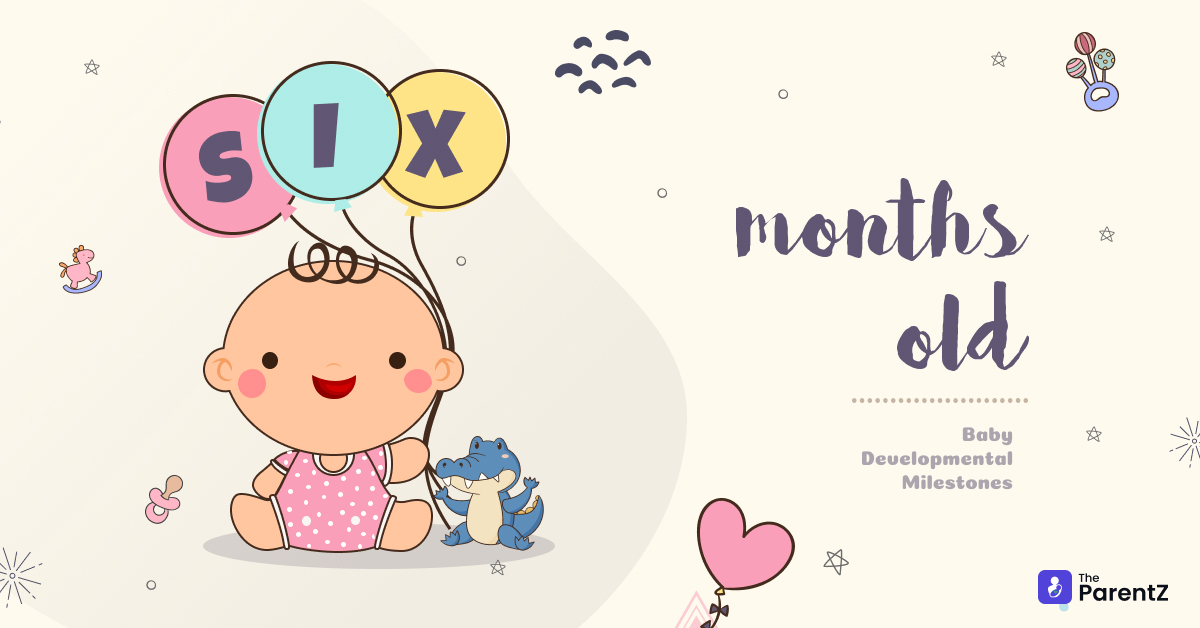Your baby is way beyond where they were born. They have developed in body, power, and character. They have also been equipped with numerous skills and abilities. This article enables us to scrutinize the advances achieved by your baby in the previous month and to present to you some fascinating activities awaiting you and the baby in the sixth month. We will also emphasize the increasing independence and communication skills of your six-month-old child.
Here are some of the growth and developmental milestones your 6-month-old may reach:
6 Month Old Baby Physical Development Milestones
The physical development of your baby is progressing very fast. They are becoming more migratory and organized. Here are some of the movement, sensory, feeding, and sleep milestones you may notice in your 6-month-old baby:
Movement
- Your baby is able to sit alone for some time without any support. They can put their hands on the table in front of them for support and take a glance around.
- Your baby can reach and take hold of objects with both hands. They can transfer objects from one hand to another and put them in their mouth.
- Your baby may begin to pull himself up to a standing position using furniture support. They are able to stand with a little bit of support and can bear weight on their legs.
- Your baby may start crawling or moving by rolling, scooting, or shuffling. They can wander around and get to their desired destination.
Sensory
- Your baby can visually, manually, and orally examine objects. They can look at the form, feel, color, and sound of things.
- Your baby will want to put everything in their mouth. This is their way of life, and they chew due to teething. Ensure that they do not have access to small or sharp objects.
- Your baby may also show awareness of the various sounds. They can also rotate their heads, face the sound, and react to it. In addition, they are capable of doing familiar and unfamiliar voice discrimination.
6 Month Old Baby Social and Emotional Development Milestones
Your baby’s social and emotional development is on the right track too. They are getting more lively, and they talk to each other. They are also creating themselves and other structures. Here are some of the first words, interactions, and attachment milestones you may observe in your 6-month-old baby:
First Words
- Your baby can babble, but with a clear intonation. They may be babbling “ba-ba,” “ma-ma,” or “da-da” sounds. They can also change their voice’s pitch, loudness, and rate.
- Your baby consistently responds to their name. They can gaze at you when you call them or track your voice with their eyes. They can also identify their name from other words.
- Your baby might utter their first words. Also, they may echo some simple words, for example, “mama,” “dada,” or “bye-bye.” They may not yet understand what these words mean, but they learn to mimic the sounds and connect them with people or objects.
Interaction
- Your baby will have very strong and differentiating tastes for familiar people and toys. They may grin, chuckle, or grab at them. They may also demonstrate dissatisfaction with what they hate.
- Your baby can echo sounds and movements. They can imitate your facial expressions, body movements, or sounds. They can also copy the actions that you take with the objects, for example, shaking a rattle or banging a spoon.
- Social games such as peek-a-boo delight your baby. They can predict what will come next and therefore respond with either wonder or enjoyment. They can also start or participate in the game by hiding their face or yours.
Attachment
- Your baby can exhibit a strong attachment to caregivers. They may look up to you for love and care when they are scared, tired, or injured. They may also hug, kiss, or smile at you to indicate that they like you.
- The highest point of your baby separation anxiety may be observed. They might wail or hold onto you when you say goodbye to them or when someone new tries to approach them. They will also look at you quite often when you are in the same room.
- Your baby may show the stranger more severe anxiety. They could be shy, nervous, or afraid around unfamiliar people or areas. They may also have an aversion to being held or touched by people they do not know.
Feeding
- Start puréed foods. Your baby might be prepared for puréed fruits, vegetables, or cereals. One new food should be introduced at one time, and the baby should be observed for any symptoms of allergies or intolerance. Never start solid foods without consulting your pediatrician, and follow his or her advice on the amounts and frequency of feeding.
- Your baby can start on semi-solid food. Pureed or mashed fruits, vegetables, cereals, and meats can be ingested by them. Another option for finger foods is to offer some soft foods, such as slices of banana, cooked pasta, or cubes of cheese.
- Start sippy cups. Your toddler might be able to take water from a sippy cup, which can make things easier during the transition from bottle to breast. You can give them water or diluted juice in a sippy cup and allow them to try holding and tipping it.
- Your baby can spoon better. They can, to a certain degree, grasp the spoon and lift it to their mouth. They can as well mouth open on seeing the spoon coming.
- Signs of hunger and fullness can be observed in your baby. They can retrieve food upon being hungry and avert their heads or close their lips when full.
Sleep
- There may be opportunities for your baby to experience sleep regressions because of developmental leaps. They might wake up at night more frequently or have difficulty falling asleep. This is natural and short-lived. It indicates that your baby is mastering some new skills and adjusting to changes.
- Your baby will benefit from developing a bedtime routine. This will help them relax and get ready for bed. Activities to be included can be baths, reading, singing, and/or cuddling.
- Self-settle is when your baby begins to sleep through the night. They are able to fall asleep again by sucking their thumb, clutching a blanket, or rocking their bodies. This can be achieved by allowing them to decide to sleep by themselves.
- Tips and advice for your 4 Month Old Baby Learn and Grow
Tips and advice for your 4 Month Old Baby Learn and Grow
- Try to do interactions with your baby. When your baby smiles, you smile; when he makes sounds, you copy them.
- Read to your baby every day
- Point out new things to your baby and name them.
- Sing to your baby and play music.
- Put your baby on her tummy or back and put toys just out of reach.
- Encourage your baby to roll over to reach the toys.
- Learn to read your baby’s moods.
- Talk to the doctor for the baby’s food plan
- Learn when your baby is hungry or full.
- Hold your baby up while she sits.
Conclusion
- Your 6-month-old baby has accomplished a lot of crucial milestones in their physical, social, and emotional development. They grow in independence and communicability. They are forming their own characters and selves. These are indications of growth and learning.
- Every baby grows in their own way. The milestones for some babies may be achieved earlier or later than others. This is all normal, and there is nothing to be concerned about. If your baby is moving forward and showing interest in the world, they are doing well.
- You can always discuss this with your pediatrician or developmental specialist if you have any concerns about your baby’s development. They can evaluate the skills of your baby and give you directions and support. They can also direct you to early intervention programs as required.
- Keep in mind that you are the first and foremost teacher to your baby. An environment that is safe, stimulating, and loving helps promote the development of your baby. You can also have fun with them, communicate with them, and read for them daily. These small activities may contribute to a great extent to the growth and happiness of your baby.


Wondering what your 7-month-old will be up to? Find out in our article on What 7 Month Old Do.








Be the first one to comment on this story.